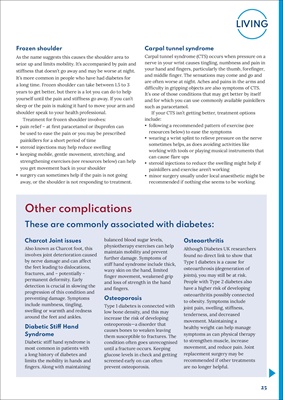
25
LIVING
to deliver two drugs that would encourage the T cells
that regulate the immune system to instruct it not to
hunt down beta cells. It's currently running Phase 1 and
2 trials.
But perhaps the most interesting development in the
immunotherapy arena is the new drug Teplizumab. The
trial, run by TrialNet, an international group of scientists,
doctors and healthcare teams which aims to find a way
to prevent Type 1 diabetes, enrolled participants who
had some beta cells remaining. After six years on the
drug, they were found to be less likely to develop Type 1
diabetes than other high-risk participants on a dummy
drug. Overall, Teplizumab delayed onset of the condition
by three years. There's hope it will soon be licensed for
use in the US and UK.
But there have been failures with other
immunotherapies, so it would be unwise to get too
carried away just yet. It's still too early to know whether
they could end up replacing insulin, or reducing time on
it, or the quantity required.
Other Type 1 solutions
Researchers are looking for ways of predicting who
might be at high risk of developing Type 1 diabetes,
with the idea of channelling those people - generally
newborns - into a prevention programme. Dr Richard
Oram at Exeter University is working on a risk calculator
based on genes known to be involved in the onset of
Type 1, funded by Diabetes UK.
Other researchers are working on a variety of
creative prevention methods. The Global Platform for the
Prevention of Autoimmune Diabetes (GPPAD), launched
in 2015, is about halfway through its seven-year POiNT
trial, in which high-risk infants are given insulin powder
to see if this trains their immune system not to react
against its own insulin-making cells.
Another intriguing oral trial is taking place. The DRI
wants to investigate whether a combination of Vitamin D
and Omega-3 could slow down or stop the progression
of the autoimmune process in Type 1 diabetes. Previous
scientific papers have suggested both might have a
beneficial effect on autoimmune diseases. Time will tell.
With both Type 1 and Type 2 diabetes, the twinkle in
scientists' eyes is becoming a stronger gleam, but there
is still a way to go before we can announce the end of
insulin or talk confidently about a cure.
Read more about some of the developments that
could one day spell an end to insulin:
www.labiotech.eu
www.diabetes.org.uk
Susannah Hickling is an experienced healthwriter with a
particular interest in diabetes having previously worked
with Diabetes UK.
And Type 2?
Many research projects are aimed at people with
or at risk of Type 1 diabetes. But there's work
afoot on preventing, delaying or curing Type 2
as well.
As well as the successful DiRECT trial,
supported by Diabetes UK, which has shown that
Type 2 diabetes can be put in remission with a
low-calorie, diet-based weight-management
programme, research is focusing on drugs. The
aim is to lower blood glucose and prevent people
with the condition progressing to insulin. Use of
insulin in people with Type 2 has dropped thanks
to drugs that are already available, like the
glucagon-like peptide 1s (GLP-1s) semaglutide
(Ozempic) and dulaglutide (Trulicity). These help
the body to produce more insulin when needed
and reduce the glucose the liver produces at
other times.
Beyond this, French firm Poxel's imeglimin
tablet has been launched in Japan as Twymeeg.
It was found in trials to successfully lower blood
glucose in people with Type 2 diabetes, tackling
both lack of insulin production and insulin
resistance. There are also drugs in development
that target obesity, a major risk factor for Type
2. These include one from Bentagenon and Baltic
Bio which aims both to control blood sugar levels
and reduce blood pressure, and an antibody,
Bimagrumab, from German biopharma company
MorphoSys and Novartis, designed to reduce fat
and prevent insulin resistance.
Scientists are also looking at the role
microbes in the gut can play in slowing the
advance of diabetes. This branch of diabetes
science is in its infancy but faecal transplants
- yes, that does mean a poo transplant! -
have been shown in trials to improve insulin
resistance temporarily in obese people with
Type 2 and to preserve beta cell function in
people newly diagnosed with Type 1.